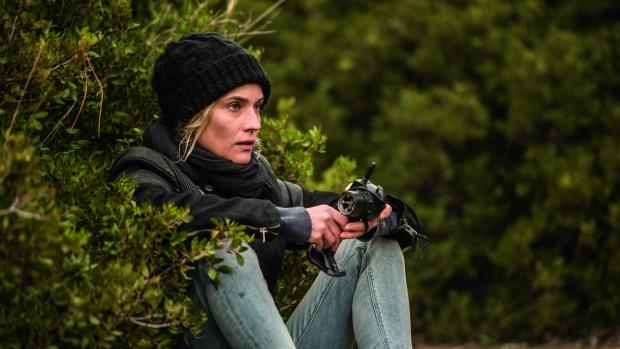Advertisement
[NOTE: This review may contain plot spoilers.]
I never fail to be astonished at how the arts, as Shakespeare put it, hold a mirror up to nature, that is, to our society and current events. As the rightwing anti-immigrant, anti-Muslim tide rises, with its ripped-from-the-proverbial-headlines vibe, In the Fade (Aus dem Nichts) is a case in point. This German neo-nazi drama written and directed by Turkish-German auteur Fatih Akin’s (Head On, Soul Kitchen, The Edge of Heaven) is extremely timely.
Specifically speaking, Fade has its filmic finger on the societal pulse not only due to the Charlottesville Nuremburg rally but because there’s currently lots of chatter about “lone wolf” terrorists who independently take matters into their own hands in the West. Usually, these non-state actors are represented as admirers and/or adherents of jihad-inspired groups such as Isis. But a trend may be emerging onstage and onscreen wherein antifascist individuals take vigilante direct action against ultra-right extremists. This was the major plot point in the two-act Daytona by playwright Oliver Cotton, with the envelope-pushing Rogue Machine Theatre presenting its U.S. premiere last September in L.A. Fade’s protagonist Katja Sekerci (Diane Kruger) follows a similar fateful, violent course.
Unlike Daytona, which is set in Florida and New York, Fade is a thriller that takes place in modern Hamburg, Germany and Greece. Katja’s husband and son Nuri (Turkish-born Numan Acar, who has appeared in Showtime’s Homeland as Haissam Haqqani and the 2016 Armenian genocide tragedy The Promise) and Rocco (Rafael Santana), are blown up in what appears to be a premeditated neo-nazi terrorist sneak attack. Although fascist sympathizers André Möller (Ulrich Brandoff) and his wife Edda (Hanna Hilsdorf) are arrested and tried, what happens is “Exhibit A” of the wariness and distrust Alfred Hitchcock always displayed towards the police (and by extension the courts).
Because Katja and Nuri have a history tied to hashish - which Nuri was incarcerated for - and even “worse” in the eyes of the contemporary German state is of Turkish ancestry, much of the investigation into his death and the Möllers’ trial is a case of “blame the victims.” Never mind that Nuri studied business administration behind bars and turned his life around after serving time by establishing his own legitimate small business - he is first and foremost guilty of operating his office while Turkish. It doesn’t matter that Nuri paid his debt to society - will the German judicial system convict the Aryan Möllers of committing a murderous hate crime against the Turkish Nuri and Rocco??? Wanna make a bet?
Confronted by the failure of the German capitalist state to render justice, Katja embarks on individually seeking vengeance for her slain loved ones. She’s essentially alone, with the exception of her dedicated attorney Danilo (Denis Moschitto), who promises to appeal the verdict. But instead of pursuing further legal recourse or joining an antifa (militant antifascist) course, like an anti-nazi John Wayne or Gary Cooper Katja decides to ride alone. Her Homeric odyssey for justice takes her, appropriately, to Ulysses’ homeland, Greece, as she tries to track the Hitlerian hit man and woman down and, with some poetic justice, confront them with a dose of their own, as Bob Dylan put it, “mixing up the medicine.”
Diane Kruger is superb portraying a tortured character with her own “Subterranean Homesick Blues” who is “thinking about the government.” Kruger won the Best Actress Award at 2017’s Cannes Film Festival for her depiction of the anguished Katja who decides to take direct action against the neo-nazi assassins of her husband and child. Like, say, Catherine Deneuve, Kruger is a European beauty who has crossed over the Atlantic - American audiences saw her in Quentin Tarantino’s anti-nazi Inglourious Basterds. The gifted Kruger has also portrayed royalty, playing Marie Antoinette in 2012’s Farewell, My Queen and the title role in TV’s The Kellyanne Conway Story (“Let them eat alternative facts!”). Kruger also appears as a talking head in the documentary about another German actress, Bombshell: The Hedy Lamarr Story, that is now playing at a Laemmle theater in L.A. (Fade, which was screened at AFI Fest, theatrically opens Dec. 27 at Laemmle's Royal Theatre.)
In the Fade is Golden Globe-nominated for Best Foreign Film and I wouldn’t be surprised if it was likewise Oscar nommed and, in this woman-oriented year in Hollywood, if portraying an empowered woman Kruger also picks up a Best Actress Academy Award nomination. I predict she will face off against Meryl Streep for The Post but that Frances McDormand will win that coveted golden statuette for Three Billboards Outside Ebbing, Missouri. Remember volks, you heard it hear first!
Although Fade is indeed a stylishly made political film with important things to say, some will likely deem it dubious to include graphic, explicit explication of the materials that go into making a do-it-yourself bomb and then demonstrating “mixing up the medicine.” When I lived in Micronesia in the 1980s, after television was introduced to the islands, I remember an astute Palauan observer commenting that police procedurals actually taught would-be criminals in Palau techniques for how to carry out and commit crimes.
Although Kruger delivers an undeniably compelling performance, some may also take issue with Akin’s script (which adapted Hark Bohm’s novel, inspired by a spate of actual neo-nazi racist attacks in Hamburg). Instead of going it alone like a cowgirl, perhaps Katja should have joined the heroic antifa militant movement and participated in organized direct action against resurgent fascists. Why be a lone wolf when you can run with a pack instead?
Especially given the resurgence of the anti-immigrant right in today’s Germany, reacting against Hamburg-born Chancellor Angela Merkel’s merciful policies towards refugees (seems like the former resident of the German Democratic Republic may have actually learned something about socialist solidarity growing up in the GDR after all). But this is an ideological quibble which shouldn’t stop viewers of intelligent, well-made movies from seeing the thought provoking, gripping In the Fade, which has ticket buyers sitting the edge of their seats by daring to dramatize important issues and big ideas on the big screen.
To read Ed Rampell’s review of Mark Bray’s Antifa book in the current issue of The Progressive Magazine see: http://progressive.org/magazine/our-favorite-books-of-2017-171205/.
The third edition of “The Hawaii Movie and Television Book” co-authored by L.A.-based film historian/reviewer Rampell drops in March 2018. (See: http://hawaiimtvbook.weebly.com/.)



